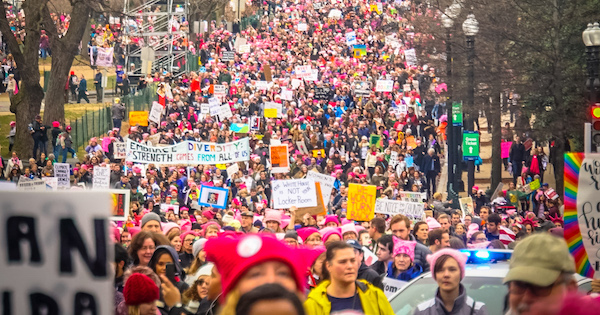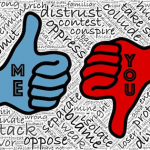
REBECCA BRATTEN WEISS, blogger at Suspended in her Jar (Catholic): I am sort of bursting with irritation right now, having seen the rampant misogyny in reactions to the Women’s March, from some unexpected places as well as from the Usual Suspects. This might have something to do with my particular milieu; have you seen much of that?
LIBBY ANNE, blogger at Love, Joy, Feminism (atheist): I’ve seen it too, though given my vantage point I’ve actually seen more arguments within the Left over what inclusion looks like. Those can be difficult conversations to have, because we have to maintain a broad coalition and numbers while also finding ways to listen to different groups. But I have done enough glancing around more right-wing sources to know that there are many people missing the point. Doug Wilson, a very conservative evangelical leader my parents followed when I grew up, has been chief among them, but then he is one of what you would probably call the Usual Suspects.
I will add that while there were many men at the marches — I did attend one — I was fascinated about how clear it was that women were leading them, and that women were in the majority. It very much felt as though the men who were there were there to support, and not to take over. I also know many, many women whose husbands cared for the kids, and happily so, while they went to the marches. From a women’s rights perspective, I find that very interesting. It was a fascinating dynamic.
What sorts of things have you been seeing?
Rebecca: Some of it was so painfully stereotypical, I was amazed that anyone would stoop to being not only so malicious, but so….uninteresting? Reposting memes denigrating the appearance of the women marching. Sharing quotes about getting back in the kitchen and making sammiches. Or how finally men could have a day of peace, with the women out of the house (this from the same people who think women should be IN the house). Images of women in the military, with the statement that “this is how real women march” (from people who don’t think women should be in the military). Images of storming the beaches of Normandy, saying “This is how real heroes take down fascism (from people who constantly deny that there’s anything fascist about the Trump regime).
But the weirdest was a guy mansplaining, kindly and sadly, that these women were all marching because they were lost without real men in their lives. “When men become boys, women become men.”
Like, yeah dude. Way to make the Women’s March all about how we need men. My inner Gloria Steinem is rising (and I never knew I had one).
Libby: That’s fascinating. I’ve actually missed most of that, which speaks to the bubble we’re each in (though I try not to be). It’s interesting how moments like this can bring out straight-up misogyny. What I’ve seen, more than what you’re describing, is confusion as to why the women’s march was taking place — as though you couldn’t just look that up and find out. My friend Samantha Field wrote a very interesting post about this in which she likened the march to evangelical culture wars, where there are many different issues that are all brought together under one overarching campaign.
Men’s responses to women’s activism have so many similarities over time. I’m thinking, for instance, of the propaganda created to deride the women’s suffrage movement, including images of women abandoning their babies and men looking askance as though they don’t know how to care for said babies, even for an evening. This idea that women have a specific place they’re supposed to be in is very strong.
Another thing I’ve noticed, now that I’m thinking about it, is a tendency to boil the women’s march down to one issue — abortion. Or maybe, abortion plus birth control. But again, I was at one of the marches, one of the larger ones, and while there certainly were pro-choice signs, there were far, far more signs against sexual assault, or in favor of immigrants. It’s as though opponents want to pigeonhole the women’s marchers into being one-issue demonstrators, and they choose one of the more controversial and divisive issues to do so. What I saw was far different.
Rebecca: I was just teaching on women’s suffrage, and made a point of reiterating that while we NOW look back on these women and venerate them as heroes, the same people who are denigrating the women marching today, would have been out there harassing the women marching a century ago. Of course, these days it’s less acceptable for them to publicly harass women, so they hide behind computer screens and cartoon frog avatars.
After New Wave Feminists were barred from sponsoring the march (though they still went, as did many of my pro-life feminist friends – and had a very welcoming, good experience) a bunch of anti-feminists were all “see, they don’t want you, I told you all along that feminism is all about abortion, neener neener.” Ironically, of course, this from women who have been happily lodged in bubbles their whole lives, never studied feminism, never participated in activism, but they have no interest in educating themselves on this.
I think what ended up happening was that women from different perspectives were able to come together and see how much common ground we have.
I do know there were complaints from some women of color about it being a mostly white-woman affair, and I had to recognize that I might just not notice it if it was, since as a white woman I am often just unable to see as clearly when there are instances of discrimination.
Libby: Ah, there are several things here I feel I can respond to. First, I heard the complaints about it being a mostly white-woman affair as well. I do think it is important to ensure that there are women of color amongst the organizers of movements like these, because they will best know how to reach out to women of color, and how to make marches accessible. There are a variety of reasons that might prevent women of color from participating, down to things we might not even think of, like transportation. I also want to note, though, that the march I attended was far from a white-woman affair. There were many, many women of color there, and proud, and I don’t want conversations about the racial makeup of the march to erase them.
As to New Wave Feminists, and to the march bringing people together, I think your point is very interesting. Again, signs about abortion were comparatively rare at the march I went to, compared to signs about things like maternity leave or listening to women’s voices or black lives matter. I think it can be easy to be divided by individual issues when in fact there is much we can come together on. I also think that — and I wrote a blog post about this — that there are women who are anti-abortion who can get on board with things like expanded birth control access, maternity leave, etc.
I know personally that a lot of my pro-choice friends are most concerned about the reality of back-alley abortions if you ban abortion — it doesn’t just go away — and I know there are at least some pro-life women who are aware of that, and who view preventing unwanted pregnancies and ensuring that women can afford to carry to term as a better solution than a focus on legal bans. However, these voices are not the ones that are most heard, or (from what I can see) at all most prevalent.
But you’re right that people were able to come together at the march on issues that have broad support among the march’s audience, including immigrant rights and sexual assault, etc.
Rebecca: So true that those voices you mention are not the ones that are most widely heard. If they were, there would have been widespread outcry against Trump from movement leaders. Instead, they rushed to support him. Enthusiastically! Which made me kind of sick. And kind of afraid.
My own approach to the abortion issue, which I’m hoping will become more common as part of a resistance movement, is that there is a reason why it exists — there’s a reason why there’s a demand for it — because women aren’t going to just go get abortions because they happen to be available, because they’re hip or trendy. So eliminating supply doesn’t touch on the problem that there’s a demand for abortion because women often are offered no other choice. With no parental leave, slashed health benefits, low wages, women being stuck working long hours caring for kids they already have — it’s ridiculous to say “choose life, be heroic!”, especially from a standpoint of relative privilege. To say that while taking away their health care and their protection against discrimination? Total hypocrisy.
Libby: I’ve often felt that if I were to become pregnant with a third child accidentally — and we don’t plan to have a third biological child, we’re happy with our two — I would probably carry to term and keep it. While I am pro-choice, I personally feel squeamish about the idea of having an abortion myself. Maybe that’s because of everything I heard growing up in an pro-life evangelical home, I don’t know. But the reality is that I have the means to care for a third child. It would still be expensive, yes, but my family is comfortably middle class. We could do it without a problem. But when I was volunteering at Planned Parenthood a few years back, and I’ll never forget this, there was a mother of four who came in for an abortion, and she said she believed it was a baby, a life, but that she didn’t feel she had any other option because she was working a minimum wage job, like $8 an hour, and was already stretched thin trying to care for the four children she had. She told me that she didn’t feel she had a choice, that she had to prioritize being able to care for the four children she already had. And that — that she felt like she *didn’t* have a choice — is an absolute travesty. At the clinic, we always tried to give women in a situation like that information about various services they qualified for, but ultimately the decision was up to them.
I sometimes feel like abortion is an issue used by mostly male politicians to divide women. After all, we should be able to come together on things like maternity leave, childcare costs, birth control access, etc., regardless of our position on abortion. But instead, these mostly male politicians make the issue all about restricting access to legal abortions. It’s always about banning abortions, and never about increasing women’s options or cutting down on the demand for abortion. And when they do address the demand, these mostly male politicians suggest that women should just stop having sex, which if your priority is cutting down on the number of abortions (rather than controlling the kind of sex women have) is a terrible argument, because women aren’t going to just stop having sex. If you want to “save babies” as they claim, you should be focusing on ways you can actually do that — birth control, social programs, and so on.
Anyway, to tie this back into the march, I don’t *think* it was men who initiated the controversy over New Wave Feminists, but the issue definitely did threaten to derail a certain amount of unity on things women really should be able to come together on, and ultimately did come together on.
Rebecca: And that’s what I thought was like this wonderful, unexpected side-effect of a horrendous political situation: we have all of these issues we can come together and focus on, and share in each other’s experiences and strengths. It’s also left me with a very real sense of which demographics simply can not be trusted to shape what I would consider a truly pro-life society. Because it’s clear to me just how much more is needed, in order to provide women with the safety and security that is our right, even before we have babies, or if we don’t have babies. And they don’t see this. And they certainly don’t see that there is a huge social justice issue that exists for women ourselves, especially women in more vulnerable demographics, before we even get to talking about pregnancy and birth options.
The great amorphous “they.”
Libby: Growing up in a pro-life home — or perhaps I should say an anti-abortion home — I heard repeatedly that those who were pro-choice were promoting a “culture of death” while we, with our opposition to abortion, were promoting a “culture of life.” It was portrayed as something more than just abortion — the argument is that if we are willing as a society to murder our innocent unborn children, well, we as a society don’t value human life, and it sort of spirals from there into something very negative and dark, cut-throat, survival of the fittest, selfish, me-first. But when I became a feminist and looked at country-level data on things like abortion rates and birth control and learned more about the huge health risks of back-alley abortions, what I found was nothing like that “culture of death” I was told about. At all.
Pro-choice feminists support things like maternity leave and affordable childcare, and spending for education and children’s welfare agencies, and they tend to be against the death penalty too. They tend to oppose corporal punishment and support encouraging each child, each individual, to explore their natural talents. They tend to recognize that not all children are born with the same opportunities, and to support policies that will help children from underprivileged backgrounds survive, and thrive. They’re against police brutality and for creating a cooperative society where people treat each other with respect. And I had to wonder, what about that is a “culture of death”? And I started looking back at the conservative teachings I’d grown up on, the idea that people on welfare are selfish, the stereotyping of black people and unwillingness to recognize privilege or the different struggles people face, the idea that people should have to work for what they get or, well, too bad for them, the heady endorsement (and even cheering) of the death penalty, their support for corporal punishment and the way they talked about children, emphasizing parental power and control — and I had to wonder, what about that reflects a “culture of life”?
And I think in some way the march this past weekend was reflective of that. I wasn’t sure what to expect, given the negative mood on Friday with the inauguration, and the sense of gloom, but what I found was energy, and excitement, and positivity. I found a very happy crowd that believed in positive things and strove to uplift each other. There was a woman holding a sign that said “my parents were immigrants” in both English and, presumably, her parents’ native language, and as the crowd moved by her (she was on a curb, up slightly), there were cheers, repeatedly, as new people moved along. It was just so positive and upbeat. And all I could think was, this is what a culture of life, a culture where people are valued and respected, looks like.
Rebecca: I grew up with that same idea, and I do believe that there is indeed such a thing as a culture of death, but I see it as being rooted in capitalism and imperialism, the willingness to reduce persons simply to producers, and only producers of things that have market value. And this is the culture that is eager to make war, and destroy the environment, and punish the criminal. And it’s because of the things women experience in workplaces and communities dominated by this ideology, that abortion ends up continuing to be in demand. Because an employer refuses a just wage. Because she can’t take time off even to have a baby. The whole business.
A curious phenomenon is that “pro-life” was initially used, as far as we can tell, in an educational text by Eric Fromm, talking about the danger of corporal punishment. It was first used to refer to abortion by a group of pacifist student activists. So this whole being pro-killing-everything-else attitude really isn’t pro-life, ideologically or historically.
Anyway, I have children howling in the basement, but I do want to say that I look forward in the years to come — difficult years, perhaps — to work with other women against these forces that try to silence and divide us.
Libby: A fitting end, I think, because that is what the women’s march looked like to me. :- ) Have a lovely evening!
Rebecca: Likewise. Peace!
Image by – 2017.01.21 Women’s March Washington, DC USA 00095 | CC BY-SA 2.0








